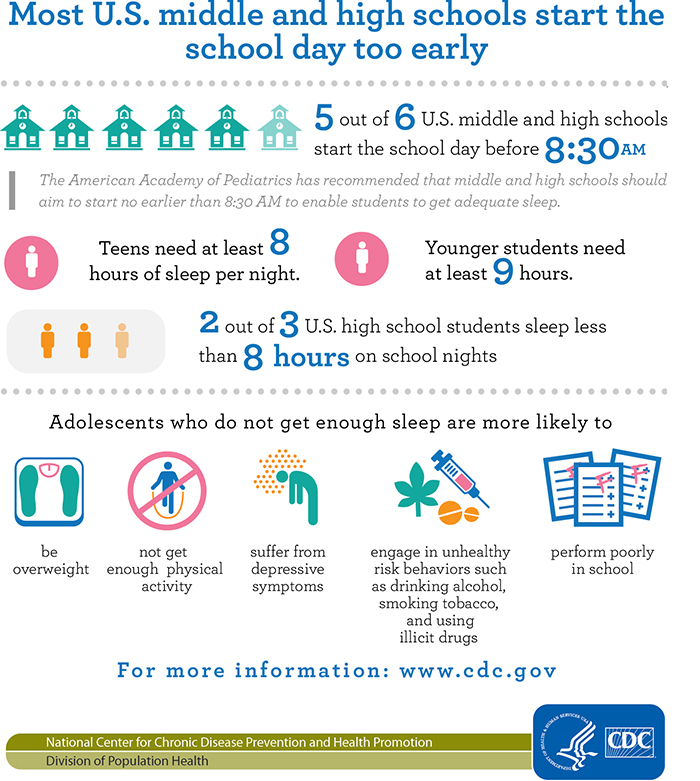Everyone can appreciate a few extra minutes of sleep each morning, especially teenagers heading off to school.
Now, a growing number of health groups, educators, parents, and others are concluding that the school day might start too early for middle and high school students. That’s what is behind a proposed bill currently before state lawmakers that would give groggy teens that precious extra time to snooze away.
 Senate Bill 328 would require California’s public middle schools and high schools to start the school day no earlier than 8:30 a.m. Currently, the average start time for middle and high schools across California is 8:07 a.m.
Senate Bill 328 would require California’s public middle schools and high schools to start the school day no earlier than 8:30 a.m. Currently, the average start time for middle and high schools across California is 8:07 a.m.
Supporters point to recent studies that say teens are arriving at school too sleepy and not prepared to concentrate during class lessons. This concept is gaining support from health organizations including the American Medical Association, American Academy of Pediatrics, and Centers for Disease Control and Prevention.
“Getting enough sleep is important for students’ health, safety, and academic performance,” Dr. Anne Wheaton, epidemiologist in CDC’s Division of Population Health, said in a statement following a study released by the agency last year. To see a summary of CDC’s study, go to the graphic at the bottom of this post.
“Early school start times, however, are preventing many adolescents from getting the sleep they need,” she said.
Pamela Kahn, a registered nurse and the health and wellness coordinator for the Orange County Department of Education, added, “It is well known that our teenagers are not getting enough sleep.”
Kahn pointed to a recent study by the National Sleep Foundation that found that teens need 8.5 to 9.25 hours of sleep nightly. However, 59 percent of middle school students and 87 percent of our high school students are not getting the recommended sleep.
“While this may not seem like a big deal, consider these facts: insufficient sleep in teens is associated with obesity, migraines and immune system disruption and with health risk behaviors including smoking, drinking, stimulant abuse, physical fighting, physical inactivity, depression and suicidal tendencies,” Kahn said.
“Sleep-deprived teens participate in more violence and property crime than other teens,” she said. “Additionally, inadequate sleep will result in problems with attention, memory, decision-making, reaction time, and creativity, all of which are important in school.”
“When schools have delayed the start of the school day, communities have seen reduced tardiness, less sleeping in class, and car crash rates, as well as improved attendance, graduation rates, and standardized test scores,” Kahn said.
But Kahn and other health care experts warn that a later school start alone won’t ensure students get a good night sleep.
“Naturally, the temptation will be for teens to simply stay up later if school start times are moved, which would still create a sleep deficit,” Kahn said.
“Creating positive habits and routines around sleep and bedtimes will help to ensure that teens not only get to bed on time, but get the restorative sleep that allows for the body and brain to grow, improve memory and learning, and better manage their stress and emotions,” she said.
Kahn offered the following tips to ensure all students get enough rest:
- Avoid oversleeping on weekends. Although catching up on some sleep on the weekends can be helpful, sleeping in until noon on Sunday will make it hard for your teenager to get back on a school schedule that night.
- Take early afternoon naps. A nap of 15-20 minutes in the early afternoon can be beneficial.
- Turn off cell phones, televisions, computers and radios. Television viewing, computer-game playing, internet use and other stimulating activities at bedtime will cause problems falling asleep.
- Avoid caffeine, smoking, alcohol and drugs. All of these cause sleep problems.
- Don’t eat, drink or exercise within a few hours of bedtime. Don’t leave homework for the last minute. Stick to quiet, calm activities, which will allow falling asleep to be much easier.
- Create bedtime routines. Doing the same things every night before going to sleep teaches your body the signals that it’s time for bed.
- Try keeping a diary or to-do lists. If you jot notes down before you go to sleep, you’ll be less likely to stay awake worrying or stressing.
- Speak to your adolescent’s physician if she has difficulties falling asleep, snores or seems excessively sleepy during the day.
SB 328, introduced by Sen. Anthony Portantino, D-Glendale, was passed by the state Senate in May. It’s now before the state Assembly, with a vote expected in coming weeks.

